
Insights into peripartum cardiac arrest
Peripartum cardiac arrest, a rare but critical medical emergency, requires prompt and coordinated intervention to improve survival outcomes for both mother and baby. The primary causes of maternal cardiac arrest vary by region but generally include hemorrhage, cardiovascular disease, amniotic fluid embolism, and sepsis. In developed healthcare settings, complications such as high neuraxial blocks and local anesthetic systemic toxicity (LAST) also contribute to these events.
The following case studies and management strategies, derived from current literature and expert guidelines, illustrate the multifaceted approach required in managing peripartum cardiac arrest.
Case 1: A pregnant patient experiencing high neuraxial block-induced arrest
- Aggressively treat hypotension using vasopressors and ensure adequate perfusion to vital organs to stabilize both maternal and fetal conditions.
Case 2: A peripartum patient experiencing LAST
- Promptly administer intralipid to neutralize the toxic effects of local anesthetics.
Case 3: Uterine atony management
- Stimulate uterine contractions through uterotonic medications to address postpartum hemorrhage.
- Effective management of uterine atony is crucial to stabilize the patient’s condition during peripartum cardiac arrest.
Case 4: Cardiac arrest with placenta previa
- Perform an emergency cesarean section if delivery is indicated to address severe bleeding and ensure maternal and fetal survival.
To read more about this topic, copy-paste this into your Google search:
Madden AM, Meng ML. Cardiopulmonary resuscitation in the pregnant patient. BJA Educ. 2020;20(8):252-258. https://www.bjaed.org/article/S2058-5349(20)30048-2/fulltext
Explore this topic and many more with our Anesthesiology Review Q&A Book, filled with engaging questions to expand your knowledge. Don’t miss out—get your copy on Amazon or Google Books.



